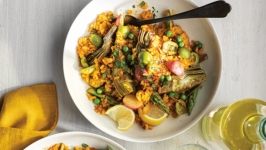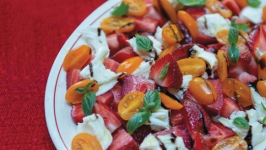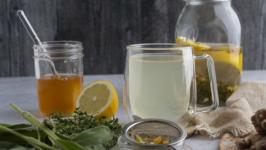Not For Sale: Fighting Slavery With Each Sip
In the lush, remote rainforest of the Peruvian Amazon, life for locals is rife with struggle.
Amidst poverty and isolation, indigenous communities also face high rates of human trafficking. More than half of all forced labor in Peru occurs in this region, according to Half Moon Bay–based nonprofit Not For Sale (NFS).
The seed for NFS was planted in 2001, when University of San Francisco ethics professor David Batstone learned that his favorite Bay Area restaurant was a hub for human trafficking. This led him to write the book Not for Sale, which was published in 2007, and co-found a nonprofit of the same name with Mark Wexler that same year. With a mission to bring down the global human slave trade, the organization fosters economic empowerment and rehabilitation for victims, while also researching and targeting root causes of the problem.
The organization has been hard at work in countries like Peru, Thailand, India and Romania to combat the modern-day slave trade—a stiff task, considering an estimated 27 million people are enslaved worldwide, according to the US Department of State.
“We do the after care and rehabilitation [for slave trade victims],” says Jessica Henry, director of marketing and public relations for NFS. “But we can’t just put Band-Aids on the problem and help those who have already been trafficked. We have to look at why communities have high rates of trafficking in the first place and come up with creative ways for keeping more people from being trafficked. We want to enact what we think will be the greatest systemic change in the landscape of slavery.”
In March 2011, NFS tasked 50 global business and industry leaders present at the organization’s social enterprise incubating event, Montara Circle, with brainstorming an outside-the-box solution for human trafficking in the Peruvian Amazon. Economic empowerment was deemed the best route to reduce the risk of enslavement and the winning idea was a separate, for-profit beverage company that sourced ingredients from the troubled region. Within 18 months, the herbal tonic company REBBL—also headquartered in Half Moon Bay—had been launched.
REBBL stands for Roots, Extracts, Berries, Bark and Leaves, and REBBL drinks are sold at 100 California retailers, including Whole Foods, and online at REBBLTonic.com.
NFS receives 2½% of REBBL’s net sales, and funnels the money back into the communities through educational scholarships, community gardens, craft training for women and more.
But the new company benefits the region in another pivotal way: by sourcing ingredients—mainly cat’s claw, which is featured in the Hibiscus Mint flavor—from the community. This creates a supply chain that spurs job creation and homegrown economic development.
Previously, locals were not harvesting the abundant herb. Since the REBBL concept was hatched, they have been trained to do so sustainably and were given a boat (and have since bought a second on their own) to transport sellable goods to a nearby port. They export ingredients destined for REBBL drinks to a processing plant in Lima, from which REBBL purchases them.
“They have all of this knowledge of the rainforest and often it’s exploited for mining or logging that they don’t want to be doing,” says Amanda Buthe, NFS social enterprise and Peru manager. “This is giving them an alternative for how to work in their local environment and use that knowledge in a way that provides sustainable [economic growth].”
NFS worked directly with a leadership council that represents more than 70 indigenous communities in the region “to listen to the people’s needs and their dreams and hopes for solving some of the issues they have,” says Buthe. The flight of youth to bigger cities was pegged as a major problem; one that leaves the small communities even more hard-pressed to improve.
In creating this drink company and its supply chain, REBBL CEO Palo Hawken says the question was, “What makes someone wake up and believe ‘I am where I should be?’”
“The idea was about what makes someone, particularly a 15- to 20-year-old in these communities, feel like they are connected to the world and doing something of value,” he says. “Something that the people buying this in America really value.”
Not all REBBL ingredients are sourced from the region, although the model was designed so that it can someday be replicated in other corners of the globe where NFS does anti-slavery work.
Hawken, known in the beverage world for co-founding Bossa Nova, was brought on to develop the tonics and wound up staying as CEO despite his hesitation to get involved in the beverage business again.
“It’s one of the most difficult areas to be successful in terms of consumer packaged goods,” he says. “Only one in 50 beverage startups makes it past five years. That said, what I saw in this opportunity was the possibility of doing something truly new—a new category no one had touched.”
Although the products are unique in their far-reaching social impacts, Hawken is referring to another standout feature—their use of ingredients from the “elite class within the elite class of herbs.”
“There are 20,000 medicinal herbs in the world,” Hawken explains. “Of those, maybe 100 of them are considered very valuable tonic herbs. Of those 100 tonic herbs, there are only about 20 or so that are classified as adaptogenic.”
Adaptogens are herbs that, as the name suggests, adjust to the body’s needs.
“For example,“ says Hawken, “the same herb could lower an overactive immune system or raise an underactive immune system.”
REBBL drinks are built around adaptogens like cat’s claw, reishi and eleuthero and bolstered with other ingredients like black tea, dandelion leaf, elderflower, ginger and cinnamon.
By crafting potent-yet-tasty tonics that pack a health punch for consumers, Hawken aims to oversee a product that is successful in its own right, regardless of its philanthropic ties. A popular, high-selling product will mean more support for NFS and its mission, he explains.
“If the product fails, people then distrust the idea of social enterprise,” he says. “I don’t want to do that. I’d like to create a brand that stands on its own and is known for what it actually is, what it contains, what’s in the bottle, and is loved. Then take the power of that and leverage it to say, ‘OK, let’s use the proven demand to go create economic opportunity where we really think it is needed.’”






